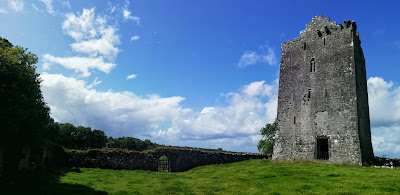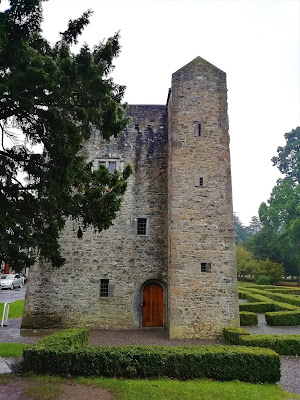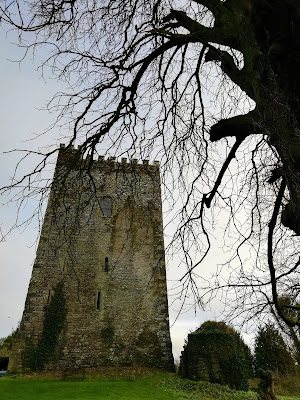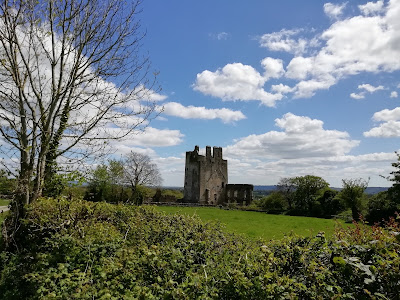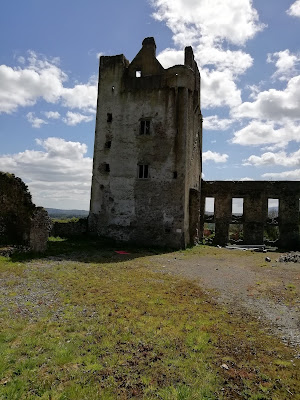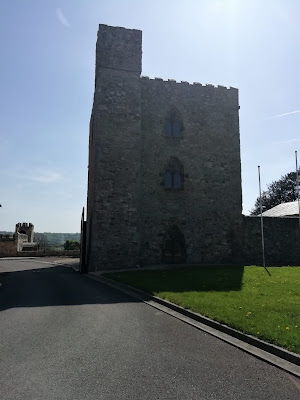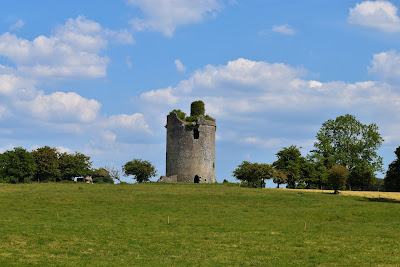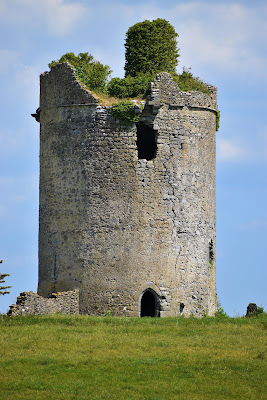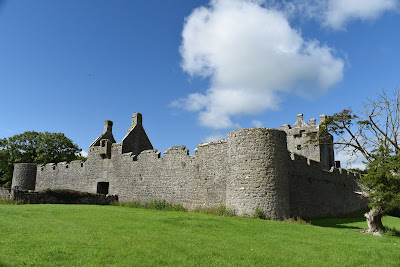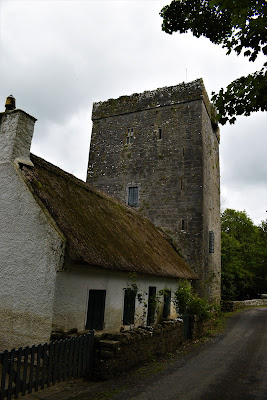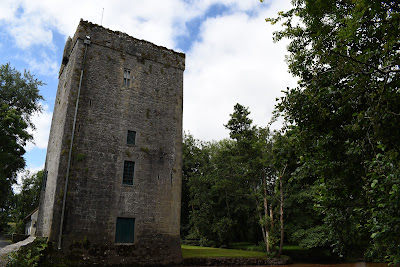Ireland is dotted with literally hundreds and hundreds of small medieval
Castles. You will often see them away in the distance across the fields
when you're travelling by road.
(This page is a copy from a recent post on my blog)
Tower House, Lackeen, Tipperary.
Associated with the family of J.F. Kennedy.
Associated with the family of J.F. Kennedy.
Note the surrounding enclosure and wall.
Most of these Castles are not Castles at all but rather they are Tower
Houses, a type of small defensive building in the shape of a single,
rectangular shaped, tall stone tower that is usually four or five
stories high.
Occasionally there were circular Tower Houses constructed.
Occasionally there were circular Tower Houses constructed.
Ashtown Castle, Dublin.
Described as a Tower House but more resembling a fortified house, possibly due to later alterations.
Described as a Tower House but more resembling a fortified house, possibly due to later alterations.
Originally most Tower Houses would have been surrounded by a small
enclosed area, a Bawn, which would have had a high defensive Bawn Wall
surrounding it.
Some Tower Houses still have the remants of their Bawn Walls standing but in most cases the Bawn Wall has long since been destroyed or fallen down.
Some Tower Houses still have the remants of their Bawn Walls standing but in most cases the Bawn Wall has long since been destroyed or fallen down.
Clonkeea Tower House, Galway.
Note the exterior plasterwork.
There are similar buildings in Scotland and northern England called "Peel Towers."
In 1429 a grant of ten pounds (£10) was issued for the building of Tower Houses in the Counties of the Irish Pale and those built around this time are sometimes known as "Ten Pound Castles."
In 1429 a grant of ten pounds (£10) was issued for the building of Tower Houses in the Counties of the Irish Pale and those built around this time are sometimes known as "Ten Pound Castles."
Quirkes Castle (Kearneys), Tipperary.
It has been incorporated into the surrounding buildings.
The Tower Houses in Ireland were chiefly constructed between roughly
1400 and 1650 but some were probably built both earlier and a little
later on from those dates.
They superceeded a two story stone structure about which relatively little is known - The Irish Hall House.
They superceeded a two story stone structure about which relatively little is known - The Irish Hall House.
Hall House - Lisbunny, Tipperary.
Generally most Tower Houses while similar in design are not identical.
The exposed stonework in the walls we can see today would have been
plastered over with some type of lime mortar or other protectant to keep
the elements at bay.
Tower House, Redwood Castle, Tipperary.
Note the corner Bartizan.
Most Tower Houses originally had very few windows other than the small
slits called arrow loops so they must have been very dark inside, even
during daylight.
Tower House, Balrothery, Dublin.
Some have defensive Machicolations above the entrance and Bartizans at
the corners which allowed for dropping projectiles down onto the heads
of any would be attackers.
Tower House, Ballaghmore, Laois.
This Tower House has a "Sheela na Gig" incorporated into the exterior wall,
a female figure with exposed genetalia.
Just inside the doorway there is often a hole in the first floor roof
overhead, a "Murder Hole." This was in case you actually made it through
the front door.
The defenders could drop projectiles, fire arrows, scald you with boiling water or generally continue to defend the building from inside if it was breeched.
The defenders could drop projectiles, fire arrows, scald you with boiling water or generally continue to defend the building from inside if it was breeched.
Tower House, Tinnakill, Laois.
The owner here was charged with "maintaining the Gallowglass."
The front door could also be protected by a type of hinged metal lattice
gate which opened separately to the door, a Yett, while inside in some
Tower Houses it was also possible to secure the door with a heavy
sliding wooden drawbar.
Clonreher Tower House, Portlaoise, Laois.
Large cracks in the masonry and overgrowing Ivy don't bode well for its future.
Occasionally there are Garderobes to be seen high up on an exterior wall which is the Tower House's equivalent of a toilet.
Basically the Garderobe allowed someone to answer natures call and the waste fell straight down and out along the exterior of the Tower wall.
Basically the Garderobe allowed someone to answer natures call and the waste fell straight down and out along the exterior of the Tower wall.
Tower House, Kilcash, Tipperary.
The base of a lot of Tower Houses and indeed that of most Castles is wider than the walls and this is known as the "Base Batter."
Pallas Castle, Galway with intact Bawn and Wall walk.
Presumably
the Base Batter strengthened this area which made it harder to breech
and because of the outward sloping angle of the Batter any projectiles
dropped onto attackers from above would hit the Batter and bounce nicely
into the enemy outside.
An unusual Circular Tower House ruin.
Golden, Tipperary.
Tower Houses would have been incredibly cold places to live. It is known
that in many instances the inhabitants simply laid rushes, reeds and
straw on the floor on which to sleep.
Listowel Castle, Kerry.
Often referred to as a Tower House.
Origins c. 13th cty.
Origins c. 13th cty.
There were once four towers associated with it.
I'm unsure as to whether it can be classified as a true Tower House.
While Tower Houses initially sprang up as defensive structures in some
areas, it is more than likely they soon became a symbol of status and
that anyone who "had a few Pounds to spare" or any considerable means
aspired to having one built for themselves. The medieval equivalent of
building a modern mansion.
Tower House, Kildare, and nearby walls which may once have been part of its defenses.
Note the exterior plasterwork, not a stone to be seen. This was probably the case in its heyday too.
The defensive use of Tower Houses was of little value when widespread
use of heavy Cannon became commonplace during land based siege or
attack.
The structure wouldn't survive a bombardment by Cannon fire for long.
Cue Oliver Cromwell & Co. who made short work of many a Tower House and Castle in Ireland.
Tower House, Clonony, Offaly.
It's thought the Bawn Wall and gateway is an 18th Cty rebuild.
It is also likely that in some cases Tower Houses were so dark, cold and
uninviting that their owners lived nearby and only retreated into the
Tower House when a threat was percieved in the area.
Because Tower Houses were constructed in Ireland over an extended period
many have been altered and differ slightly from their initial layout.
Tower House, Grange, Tipperary.
Indeed some have even been incorporated into newer structures such as cottages and houses, an example of structural evolution which is to be welcomed as it has ensured their survival.
Tower House, Grange, Tipperary.
Indeed some have even been incorporated into newer structures such as cottages and houses, an example of structural evolution which is to be welcomed as it has ensured their survival.
Tower House, Dowth, Meath.
Substantially altered and previously associated
with the Netterville family and Netterville Institute.
Quite a few of these wonderful and historic buildings are in danger of
imminent collapse and were for many decades unvalued and unloved.
Another unusual Circular Tower House at Balief Upper, Kilkenny.
Perhaps as time progress's and we come to appreciate their true value, as a nation, we will invest in their resurrection or conservation and love them for what they are, not what they are worth.
Another unusual Circular Tower House at Balief Upper, Kilkenny.
Perhaps as time progress's and we come to appreciate their true value, as a nation, we will invest in their resurrection or conservation and love them for what they are, not what they are worth.
Last but not least, I'm no expert on either Castles or Tower Houses and entire books have been written on single aspects of these structures such as their doors, stairs or masonry.
This is just a short overview of the Irish Tower House, ubiquitously dotted throughout the Irish Countryside. Hopefully when things progress later in the year if you haven't visited one you'll pay a visit then.
More Pictures of Pallas Castle, Galway.
Yeats Castle at Thoor Ballylee near Gort in Galway.
Owned for a period by the poet W.B Yeats and abutting a thatched Cottage.
Grantstown Castle in Laois. Another unusual circular Tower House. The shores of Grantstown lake nearby used to be much closer to the castle than today.
Beautiful Foulkscourt Castle near Johnstown in Kilkenny has a partially surviving Bawn wall and entrance Gatehouse.
Below is Srah Castle in Offaly just outside Tullamore.
Bridge Castle at Thurles in Tipperary, possibly built by the Knights Templar.
Doon Castle in Offaly replete with a Sheela na Gig in very good condition.
O'Dea Castle near Dysert O'Dea in Clare.
Below is another picture from Shrah Castle in Offaly. Unbelievably the local authority demolished the interior staircase in the 1980's.
A Tower House hidden in a contemporary farmyard at Two Mile Borris, Tipperary.
An unknown Tower House on a Clare road now converted and used as a house.

